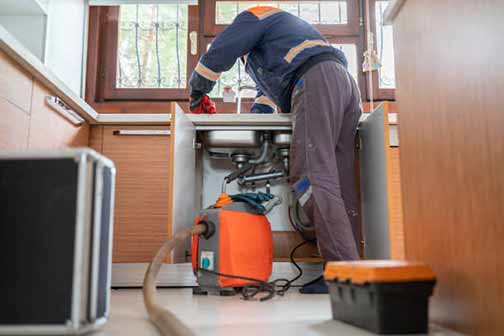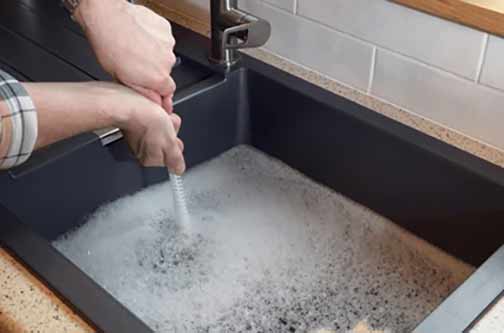Understanding the Responsibilities of Tenants and Landlords
The relationship between tenants and landlords is governed by a set of responsibilities and duties, which are often outlined in a tenancy agreement. One common issue that arises is who should handle clogged drains. Understanding the responsibilities of each party can help in resolving such disputes amicably and efficiently.
In a rental property, the division of responsibilities is crucial for maintaining a harmonious living environment. The tenancy agreement typically serves as the primary document that outlines these responsibilities. It is essential for both tenants and landlords to familiarize themselves with the terms of this agreement to avoid misunderstandings. When it comes to clogged drains, the issue can become contentious if not clearly defined in the agreement. Therefore, having a thorough understanding of each party’s duties is essential for preventing conflicts and ensuring a smooth tenancy.
Moreover, the maintenance of a rental property is a shared responsibility. While landlords are generally responsible for ensuring the property’s overall habitability, tenants must also do their part to keep the property in good condition. This collaborative effort is particularly important in the case of plumbing systems, which can be prone to issues such as clogged drains. By working together and adhering to their respective responsibilities, tenants and landlords can create a positive and cooperative living environment.
Legal Obligations of Landlords
Landlords have a legal obligation to ensure that the rental property is habitable and safe for tenants. This includes maintaining the plumbing system in good working order. If a drain becomes clogged due to normal wear and tear, it is typically the landlord’s responsibility to address the issue. Landlords should conduct regular inspections and maintenance to prevent such problems from arising.
Under various landlord-tenant laws, landlords are required to provide a habitable living environment. This legal obligation extends to the plumbing system, which must be functional and free from defects. If a drain becomes clogged due to factors beyond the tenant’s control, such as aging pipes or tree root intrusion, the landlord is responsible for resolving the issue. Regular inspections and maintenance are essential to identify potential problems before they escalate into significant issues.
Additionally, landlords should be proactive in addressing plumbing concerns. This includes responding promptly to tenant reports of slow-draining sinks or other signs of potential clogs. By taking swift action, landlords can prevent minor issues from developing into major plumbing emergencies. Furthermore, landlords should educate tenants on proper drain usage and provide guidelines to minimize the risk of clogs. This proactive approach not only ensures the property’s habitability but also fosters a positive landlord-tenant relationship.
Legal Obligations of Tenants
Tenants also have certain responsibilities when it comes to maintaining the property. They are expected to use the plumbing system properly and avoid actions that could lead to clogs, such as disposing of grease, hair, or other debris down the drain. If a clog occurs due to the tenant’s negligence, they may be responsible for the repair costs.
Tenants play a crucial role in maintaining the rental property’s plumbing system. Proper usage of the plumbing fixtures is essential to prevent clogs and other issues. Tenants should avoid disposing of inappropriate materials down the drain, such as grease, coffee grounds, and hair. These substances can accumulate over time and lead to blockages that disrupt the plumbing system’s functionality.
Furthermore, tenants should be vigilant in monitoring the condition of the drains. Early detection of slow-draining sinks or unusual odors can help prevent more severe clogs. Tenants should promptly report any plumbing concerns to the landlord to ensure timely resolution. Failure to do so may result in the tenant being held liable for any resulting damage. By adhering to these responsibilities, tenants can contribute to the overall maintenance and longevity of the property’s plumbing system.

Tenants should promptly report any plumbing concerns to the landlord to ensure timely resolution.
Preventive Maintenance Tips for Landlords
To minimize the risk of clogged drains, landlords can implement preventive maintenance measures. These include:
- Conducting regular inspections of the plumbing system
- Providing tenants with guidelines on proper drain usage
- Installing drain covers to catch debris
- Scheduling periodic professional drain cleaning services
Regular inspections are a cornerstone of preventive maintenance for landlords. By routinely checking the plumbing system, landlords can identify potential issues before they become significant problems. Inspections should include examining pipes for signs of wear and tear, checking for leaks, and ensuring that drains are flowing freely. These proactive measures can help landlords address minor concerns before they escalate into costly repairs.
In addition to inspections, landlords should educate tenants on proper drain usage. Providing tenants with clear guidelines on what can and cannot be disposed of down the drain can significantly reduce the risk of clogs. Landlords can distribute informational pamphlets or include drain usage guidelines in the tenancy agreement. This proactive approach ensures that tenants are aware of their responsibilities and can take appropriate actions to prevent clogs.
Installing drain covers is another effective preventive measure. Drain covers can catch debris such as hair and food particles, preventing them from entering the plumbing system. Landlords can provide these covers to tenants and encourage their use in high-risk areas such as kitchen sinks and shower drains. Additionally, landlords should schedule periodic professional drain cleaning services. Professional plumbers have the expertise and equipment to thoroughly clean the plumbing system, removing any buildup that could lead to clogs.
Preventive Maintenance Tips for Tenants
Tenants can also take steps to prevent drain clogs by following these tips:
- Avoid pouring grease, oil, or fat down the drain
- Use a drain strainer to catch hair and food particles
- Run hot water down the drain regularly to clear any buildup
- Report any slow-draining sinks or bathtubs to the landlord promptly
Proper drain usage is essential for tenants to prevent clogs. One of the most effective preventive measures is to avoid pouring grease, oil, or fat down the drain. These substances can solidify and adhere to the pipes, leading to blockages. Instead, tenants should dispose of grease and oil in a separate container and discard it in the trash. By taking this simple step, tenants can significantly reduce the risk of kitchen sink clogs.
Using a drain strainer is another effective preventive measure. Drain strainers can catch hair, food particles, and other debris, preventing them from entering the plumbing system. Tenants should place strainers in kitchen sinks, bathroom sinks, and shower drains to catch potential clog-causing materials. Regularly cleaning the strainers will ensure their effectiveness and prevent buildup.
Running hot water down the drain regularly can also help clear any buildup. Hot water can dissolve grease and other substances that may accumulate in the pipes. Tenants should make it a habit to run hot water down the drain after using the sink, especially in the kitchen. This simple practice can help keep the plumbing system clear and prevent clogs.
Promptly reporting any slow-draining sinks or bathtubs to the landlord is crucial for early intervention. Slow drainage can be an early sign of a developing clog. By notifying the landlord as soon as the issue is noticed, tenants can ensure that the problem is addressed before it worsens. Timely reporting and intervention can prevent more severe clogs and potential damage to the plumbing system.
Common Causes of Clogged Drains
Understanding the common causes of clogged drains can help both tenants and landlords take preventive measures. Some of the most common causes include:
- Hair buildup in bathroom drains
- Grease and food particles in kitchen sinks
- Foreign objects being flushed down the toilet
- Tree roots infiltrating the sewer line
- Mineral buildup in pipes
Hair buildup in bathroom drains is a prevalent cause of clogs. Hair can easily accumulate in shower and sink drains, creating a tangled mass that obstructs water flow. To prevent hair clogs, tenants should use drain strainers and regularly clean them to remove trapped hair. Additionally, tenants can periodically flush the drains with hot water to dissolve any soap scum or residue that may contribute to clogs.
Grease and food particles are common culprits of kitchen sink clogs. Grease can solidify in the pipes, while food particles can accumulate and create blockages. Tenants should avoid disposing of grease down the drain and use strainers to catch food particles. Regularly running hot water and using a mild drain cleaner can help prevent buildup and keep the kitchen sink flowing smoothly.
Foreign objects being flushed down the toilet can lead to severe clogs. Items such as wipes, sanitary products, and paper towels should never be flushed, as they can cause blockages in the plumbing system. Tenants should only flush toilet paper and human waste to prevent clogs. Educating tenants on proper toilet usage can significantly reduce the risk of plumbing issues.
Tree roots infiltrating the sewer line can cause significant damage and blockages. Tree roots are naturally drawn to the moisture in sewer lines and can penetrate small cracks or joints in the pipes. Once inside, the roots can grow and create obstructions. Regular camera inspections of the sewer line and maintenance by landlords can help identify and address tree root intrusion before it causes severe damage.
Mineral buildup in pipes is another common cause of clogs. Hard water contains minerals such as calcium and magnesium, which can accumulate inside the pipes over time. This buildup can restrict water flow and lead to blockages. Installing a water softener can help reduce mineral buildup and extend the life of the plumbing system. Landlords should consider this option, especially in areas with hard water.

If tenants or landlords encounter a persistent clog that does not respond to standard methods, it is time to call a professional plumber.
Resolving Disputes Over Clogged Drains
Disputes over who should handle a clogged drain can be resolved by referring to the tenancy agreement and local landlord-tenant laws. Clear communication between the tenant and landlord is crucial. If an agreement cannot be reached, mediation or legal action may be necessary.
When a clogged drain occurs, it is essential to determine the cause of the blockage to assign responsibility accurately. If the clog is due to tenant negligence, such as improper disposal of materials, the tenant may be responsible for the repair costs. Conversely, if the clog is due to normal wear and tear or structural issues, the landlord is typically responsible for addressing the problem. Referring to the tenancy agreement can provide clarity on the division of responsibilities.
Clear communication between tenants and landlords is vital in resolving disputes. Both parties should discuss the issue openly and provide any relevant information, such as maintenance records or evidence of proper drain usage. By maintaining a respectful and cooperative dialogue, tenants and landlords can work together to find a fair resolution. If an agreement cannot be reached, mediation can be a valuable tool. Mediation involves a neutral third party who helps facilitate a mutually acceptable solution. This approach can help both parties avoid the stress and expense of legal action.
In cases where mediation is unsuccessful, legal action may be necessary. Tenants and landlords should be aware of their rights and obligations under local landlord-tenant laws. Speaking with a legal professional can provide guidance on the appropriate steps to take. It is essential to document all communications and actions related to the dispute to support any legal claims. By following these steps, tenants and landlords can navigate disputes over clogged drains effectively and fairly.
When to Call a Professional Plumber
In some cases, a clogged drain may require the expertise of a professional plumber. Landlords should have a list of reliable plumbers on hand for emergencies. Tenants should notify the landlord as soon as they notice a problem, so that prompt action can be taken to prevent further damage.
While many minor clogs can be resolved with basic tools and techniques, some situations require professional intervention. If tenants or landlords encounter a persistent clog that does not respond to standard methods, it is time to call a professional plumber. Professional plumbers have the experience and specialized equipment to diagnose and resolve complex plumbing issues effectively.
Landlords should establish a relationship with reliable plumbers to ensure prompt service in case of emergencies. Having a list of trusted plumbers on hand can expedite the resolution of plumbing issues and minimize disruption for tenants. Landlords should also communicate this information to tenants, so they know who to contact in case of an urgent plumbing problem.
Tenants should notify the landlord immediately upon noticing any signs of a clogged drain. Early intervention can prevent the issue from worsening and causing more significant damage. By reporting the problem promptly, tenants enable the landlord to take swift action and address the clog before it escalates. This collaborative approach ensures that plumbing issues are resolved efficiently and minimizes inconvenience for both parties.
In some cases, a clogged drain may indicate a more severe underlying problem, such as a damaged sewer line that needs repair or extensive tree root intrusion. Professional plumbers can conduct thorough inspections and identify the root cause of the issue. Addressing these underlying problems is crucial to prevent recurring clogs and ensure the long-term functionality of the plumbing system. By relying on professional expertise, tenants and landlords can achieve effective and lasting solutions to complex plumbing issues.
To Conclude
Both tenants and landlords have roles to play in maintaining a rental property’s plumbing system. By understanding their responsibilities and taking preventive measures, they can avoid the inconvenience and expense of clogged drains. Clear communication and adherence to the tenancy agreement are key to resolving any disputes that may arise.
Maintaining a rental property’s plumbing system is a shared responsibility that requires cooperation and proactive efforts from both tenants and landlords. By understanding their respective duties and taking preventive measures, both parties can contribute to the property’s overall well-being. Clear communication is essential in addressing plumbing concerns and resolving disputes amicably. By adhering to the terms of the tenancy agreement and following best practices for drain usage, tenants and landlords can create a positive and cooperative living environment.
In conclusion, the issue of clogged drains in rental properties can be effectively managed through a combination of preventive maintenance, clear communication, and adherence to legal obligations. Both tenants and landlords must play their part in maintaining the plumbing system and addressing issues promptly. By working together and taking proactive steps, they can avoid the inconvenience and expense associated with clogged drains. Ultimately, a collaborative approach fosters a positive landlord-tenant relationship and ensures a well-maintained and habitable rental property.
